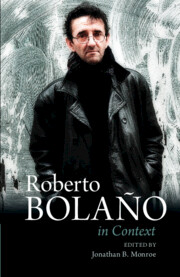Book contents
- Roberto Bolaño in Context
- Roberto Bolaño in Context
- Copyright page
- Contents
- Contributors
- Chronology
- Part I Geographical, Social, and Historical Contexts
- Chapter 1 Mapping Bolaño’s Worlds
- Chapter 2 Chile, 1953–1973
- 3 The Pinochet Era, 1973–1990
- Chapter 4 Dictatorships in the Southern Cone
- Chapter 5 Mexico City, 1968
- Chapter 6 Mexico City, Paris, and Life versus Art
- Chapter 7 Spain, Europe: 1977–2003
- Chapter 8 Transnational Currents: Europe and the Americas
- Part II Shaping Events and Literary History
- Part III Genres, Discourses, Media
- Part IV Aesthetics, Culture, and Politics
- Further Reading
- Index
3 - The Pinochet Era, 1973–1990
from Part I - Geographical, Social, and Historical Contexts
Published online by Cambridge University Press: 15 December 2022
- Roberto Bolaño in Context
- Roberto Bolaño in Context
- Copyright page
- Contents
- Contributors
- Chronology
- Part I Geographical, Social, and Historical Contexts
- Chapter 1 Mapping Bolaño’s Worlds
- Chapter 2 Chile, 1953–1973
- 3 The Pinochet Era, 1973–1990
- Chapter 4 Dictatorships in the Southern Cone
- Chapter 5 Mexico City, 1968
- Chapter 6 Mexico City, Paris, and Life versus Art
- Chapter 7 Spain, Europe: 1977–2003
- Chapter 8 Transnational Currents: Europe and the Americas
- Part II Shaping Events and Literary History
- Part III Genres, Discourses, Media
- Part IV Aesthetics, Culture, and Politics
- Further Reading
- Index
Summary
This chapter focuses on Bolaño’s writings that confront the dictatorship of Augusto Pinochet Ugarte (1973–1990) and the complicity of intellectuals with Pinochet’s dictatorial state. Prior to Bolaño, few if any Chilean writers had reflected on complicity at such length or with such scathing intentionality. His works illuminate the moral gray zones to which the dictatorship gave rise and the myriad ways civilians and intellectuals became implicated in the regime’s reign of terror. Focusing especially on Bolaño’s 1996 novel Estrella distante (Distant Star, 2004) and his 2000 novel Nocturno de Chile (By Night in Chile, 2003), the chapter evokes several scenes from Bolaño’s two “dictatorship” novels to illustrate a wide spectrum of characters that range from fully complicit subjects to “implicated subjects” (Michael Rothberg). If the poet-killer Carlos Wieder, also known as Alberto Ruíz-Tagle, is clearly an accomplice to the Pinochet regime in Distant Star, figures such as the Opus Dei priest Sebastián Urrutia Lacroix or the belle of the literary salons María Canales in By Night in Chile, might be more aptly characterized as implicated subjects whose example brings into relief the ways a “civilized” culture inhabited by barbarism becomes part and parcel of dictatorial rule.
- Type
- Chapter
- Information
- Roberto Bolaño In Context , pp. 33 - 45Publisher: Cambridge University PressPrint publication year: 2023



